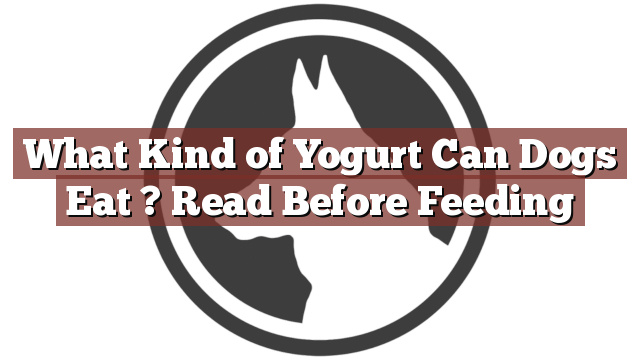Understanding Your Dog’s Dietary Needs
As a responsible pet owner, it is crucial to understand your dog’s dietary needs to ensure their overall health and well-being. While dogs primarily thrive on a diet of high-quality dog food that meets their nutritional requirements, there are certain human foods that can be safely incorporated into their diet in moderation. One such food is yogurt. However, before you reach for that tub of yogurt, it is important to know which types are safe for your furry friend to consume.
What Kind of Yogurt Can Dogs Eat? Read Before Feeding
Can dogs eat yogurt? The answer is yes, but with a few considerations. Plain, unsweetened yogurt is generally safe for dogs to eat in small amounts. Yogurt contains probiotics, which are beneficial for a dog’s digestive system, just like they are for humans. These live bacteria cultures can help regulate your dog’s gut health and aid in digestion. However, not all yogurt varieties are created equal when it comes to the health of your canine companion.
It is important to note that flavored yogurts, particularly those with artificial sweeteners or additives, should be avoided as they can be harmful to dogs. These additives can upset your dog’s stomach and potentially lead to serious health issues. Additionally, yogurt with high sugar content should be avoided as it can contribute to weight gain and dental problems in dogs.
When selecting yogurt for your dog, opt for plain, unsweetened yogurt with no added flavors or sweeteners. Greek yogurt is a good choice as it contains a higher protein content and lower lactose levels. If your dog has never had yogurt before, introduce it gradually and monitor their reaction for any signs of digestive upset.
Pros and Cons of Feeding Yogurt to Dogs
Feeding yogurt to your dog can have several benefits. The probiotics in yogurt can promote a healthy gut and improve digestion, especially if your dog has been on antibiotics or has a sensitive stomach. Additionally, yogurt can be a good source of calcium and protein for dogs. It can also serve as a delicious and nutritious treat that you can use for training or as a special reward.
However, it is important to be aware of the potential downsides of feeding yogurt to your dog. Some dogs may be lactose intolerant, and consuming yogurt can cause digestive issues such as diarrhea or gas. It is always recommended to consult with your veterinarian before introducing any new food into your dog’s diet to ensure it is safe and appropriate for their specific needs.
Conclusion: Consider Yogurt as a Healthy Treat for Dogs with Caution
In conclusion, yogurt can be a healthy addition to your dog’s diet when given in moderation and the right form. Plain, unsweetened yogurt is generally safe and can provide digestive benefits due to its probiotic content. However, flavored yogurts, particularly those with additives and high sugar content, should be avoided. It is always essential to consider your dog’s individual dietary needs and consult with your veterinarian before introducing any new food into their diet. By doing so, you can ensure that your furry friend stays happy, healthy, and well-nourished.
Thank you for taking the time to read through our exploration of [page_title]. As every dog lover knows, our furry friends have unique dietary needs and responses, often varying from one canine to another. This is why it's paramount to approach any changes in their diet with caution and knowledge.
Before introducing any new treats or making alterations to your dog's diet based on our insights, it's crucial to consult with a veterinarian about [page_title]. Their expertise ensures that the choices you make are well-suited to your particular pet's health and well-being.
Even seemingly harmless foods can sometimes lead to allergic reactions or digestive issues, which is why monitoring your dog after introducing any new food item is essential.
The content provided here on [page_title] is crafted with care, thorough research, and a genuine love for dogs. Nevertheless, it serves as a general guideline and should not be considered a substitute for professional veterinary advice.
Always prioritize the expert insights of your veterinarian, and remember that the health and happiness of your furry companion come first.
May your journey with your pet continue to be filled with joy, love, and safe culinary adventures. Happy reading, and even happier snacking for your canine friend!

